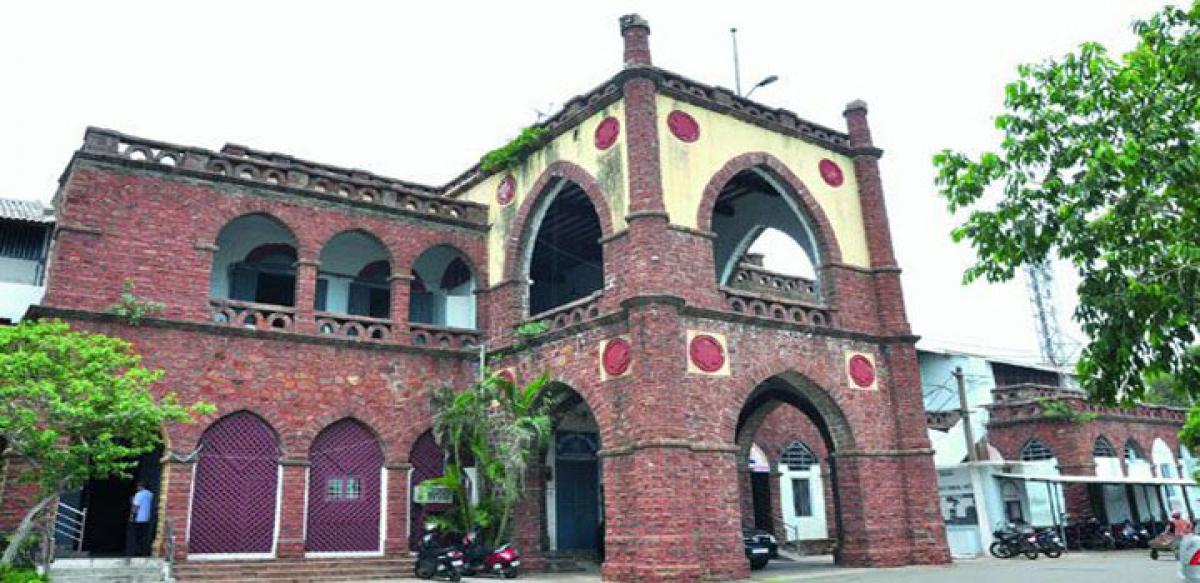First educational institution to come up in British India

Mrs AVN College is one of the first educational institutions to come up with the initiative of local zamindars. 1857 sepoy mutiny or The first war of Independence has caused reverberations throughout the Indian sub-continent which led to the establishment of 10 other educational institutions in Bombay,
Mrs AVN College, Visakhapatnam

Mrs AVN College is one of the first educational institutions to come up with the initiative of local zamindars. 1857 sepoy mutiny or The first war of Independence has caused reverberations throughout the Indian sub-continent which led to the establishment of 10 other educational institutions in Bombay,
Ahmedabad Varanasi, Mezhuvela(Kerala), Lahore, Pune and Calcutta as part of a humble initiative. Facing initial hiccups and producing meritorious scholars Mrs AVN College started as a school in 1860, by 1882, with the munificence of the Ankitam family, it has became one of the first degree colleges to be established in the crown ruled India.
In the year 1878 it came to be known as Hindu College, starting with the first Principal E Winckler, who was earlier Head Master of the School, scholars both of European and Indian origins like H H Anderson, RS Sheppard, W Ramaiah, P T Srinivasa Iyengar were responsible for high standing of the College. Ankitam Venkata Narasimha Rao, donated eleven acres of land and fifteen thousand rupees as building grant for the college. Since then college has come to be known as Mrs AVN College.
The college has thirty five PHD holders in the teaching staff. Being a proud institution of a ward C.V.Raman, who went on to become Nobel laureate in 1930, this heritage college has seen the eminence achieved by the students in various walks of life like science, literature, championing social causes, politics, public administration, field of music, and experts who stood out as skilled exponents of ace theatrics.
Nobel laureate Chandrasekhar Venkata Raman (CV Raman), born in 1888, had his early schooling and intermediate studies, with the Mrs. AVN College mainly because his father was working as a lecturer of Mathematics and Physics at the college. He matriculated at the age of 11 years, and completed his PUC during the years 1900-1902 by his thirteenth year.
The Alumina of college include- Prof CR Rao, the hero of the Manyam rebellion Alluri Seeta Rama Raju, Dwaram Venkata Swami Nayudu, Sir Vepa Ramesam, Sir BN Sarma, Tenneti Visvanatham, political icon of the region, the great revolutionary poet Sri Sri, SV Rangarao, Sonthi Ramamoorthi, Prof B Rama Chandra Rao, Ex-vice-chairman UGC, Prof Maddi Gopala Krishna Reddi, Dr Ramesh, V Sonti, K V Rao IAS, Principal Secretary to the Govt. of AP, are a few of the illustrious alumni of this hallowed institution.
Sir BN Sharma, in year 1912 opposed Gurajada and other supporters of vernacular as educational medium, and in fact, condemned on the floor of the Madras legislative Council to introduce Kasiyatra charitra, in the syllabus, in his capacity as Member of the Viceroy’s Executive Council.
He is also a close associate of Rachakonda family, in which another great writer Rachakonda Visvanatha Sastri was born. While Seetaramaraju studied in the high school, Sri Sri the revolutionary poet apart from studying also worked as a demonstrator for some time in the College.
Being a principal of this college during 1910 J.A. Yates questioned the teaching practices with Gurajada Apparao, Gidugu Ramamoorti of the college as the students are not mastering the English language as most of the subjects are taught in English.
This has lead to the uproar in defense of modern vernacular, and staunch scholars like Jayanti Ramayya Pantulu, Kandurkuri Veeresalings, Vedam Venkata Raya Sastri, Komarraju Venkata Lakshmana Rao, opposed the modernists represented by Gurajada Apparao, Gidugu Ramamoorti, J.A. Yates, and a few others. This heated exchanges between the two camps in support of diametrically opposite views as to which form of language is to be used in the medium of Education, though was initially the dice were loaded in favor of the traditionalists, around 1914-15, the time and tide have changed the attitudes of the opposing camp and in a meeting of Navya Sahitya Parishat at Kakinada, it was decided that modern vernacular to be used in all the texts, as well in public affairs.
Hence, AVN College and its glorious 155 years of existence with NAAC accreditations, being back the sharp memories of those sentinels who believed through their endeavors and exhorted every one to progress on the path of universal education, which can only be possible with a simple, lucid, and dynamic language, which is Telugu.
Thus Mrs AVN College is a page of rich Heritage, and the recent declaration by the INTACH, declaring the enshrined and hallowed portals and the front building as part of the National Heritage Monuments. This brings coveted distinction to north coastal Andhra, since the College is an inseparable part of the dawn of modernity.
By:Rama Teertha
(The writer is a poet, critic, translator and an orator)














